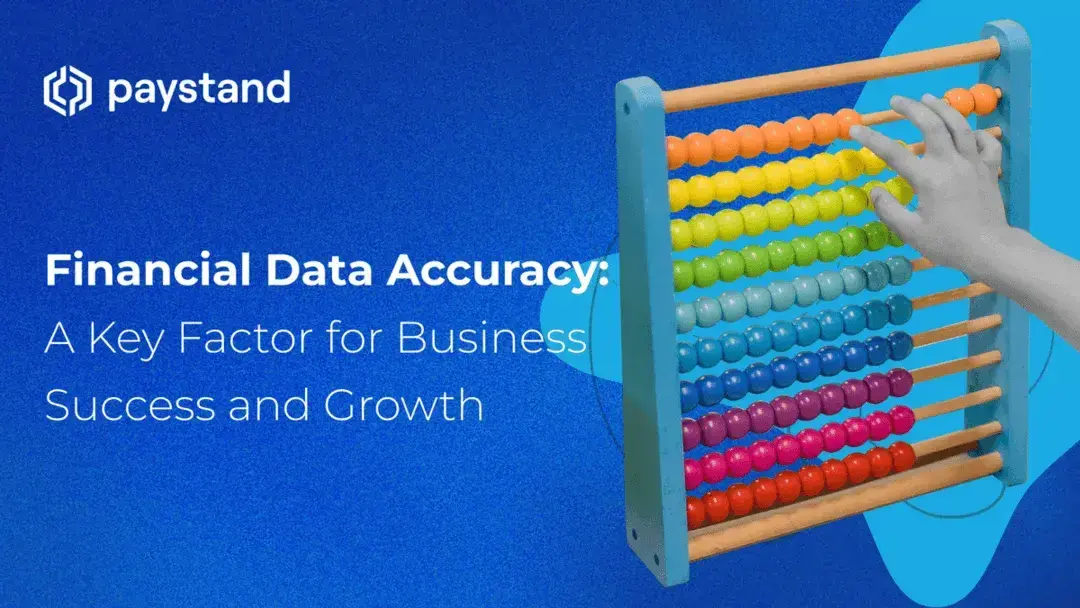Financial Data Accuracy: A Key Factor for Business Success and Growth

In today's business landscape, financial data accuracy is critical for success. Financial data comprises many monetary transactions and is crucial for organizations' decisions. It provides financial health and performance insight, guiding strategic planning and resource allocation. Ensuring its precision and reliability is fundamental for stakeholders' trust and sustainable growth.
Financial data accuracy has become even more significant in finance digital transformation. Businesses rely on it to navigate market dynamics, comply with regulatory requirements, and drive operational efficiency. However, inaccurate financial data can have severe consequences. This can lead to misguided decisions, financial losses, and reputational damage.
Focusing on best practices for ensuring financial data accuracy becomes vital. They can mitigate risks and enhance financial reporting with proactive measures, leveraging technologies, and fostering accountability. This article explores how businesses can implement best practices for financial data accuracy, laying the foundation for success.
What is Financial Data?
Financial data is information related to an organization's monetary activities and transactions. It encompasses various aspects of a company's finances, such as income, expenses, assets, liabilities, and cash flow. It also provides insights into a business's financial health and performance, enabling informed decisions.
Financial data is a snapshot of a company's financial status at a particular time. It includes records of revenue and expenses and details about the company's assets and liabilities. By analyzing this data, businesses can assess their profitability, liquidity, and financial stability.
Understanding financial data is essential for stakeholders. This includes business owners, investors, creditors, and regulatory authorities. It allows them to evaluate the company's financial position, assess its potential, and gauge its ability to meet financial obligations. Financial data is the foundation for an organization's financial planning, budgeting, and decision-making processes.
Why is Financial Data Accuracy Important?
Financial data accuracy is essential for businesses of all sizes. It serves as the cornerstone of informed decision making and strategic planning. Here's why ensuring financial information precision and reliability is crucial:
- Informed decision-making. Financial data accuracy gives insights for informed decisions about resource allocation, investment strategies, and operational priorities. This allows executives to assess financial health, identify areas for improvement, and allocate resources to drive growth and profitability.
- Transparency and credibility. Maintaining accurate financial records enhances transparency and credibility. Internally, it fosters employee confidence, ensuring their trust in the organization's financial stability and performance. Externally, it builds stakeholder trust, proving commitment to business financial management and accountability.
- Compliance and risk management. Financial data accuracy is essential for complying with regulations and financial reporting standards. By ensuring that financial statements accurately reflect a business's financial position and performance, they can avoid legal penalties, regulatory scrutiny, and reputational damage. Financial data accuracy enables effective risk management with potential risks and vulnerability insights. This allows businesses to mitigate these risks and safeguard their financial well-being proactively.
How to Calculate Financial Data Accuracy?
Accurately checking financial data is vital for businesses to make intelligent decisions and maintain trustworthy financial reports. Here are some straightforward methods used to do this:
- Financial Record Reconciliation. This means double-checking financial records against documents like bank statements and receipts. By comparing them, mistakes or differences can be spotted and fixed to ensure the data is correct.
- Planned Figures Comparison. Another way is to compare the actual numbers with what was expected or planned. This helps identify any significant differences and where adjustments are needed.
- Data Consistency and Trustworthiness. Ensuring the data matches up across different parts of the business is essential. It's like making sure all the pieces of a puzzle fit together properly. This helps ensure the data is reliable and trustworthy.
Best Practices for Maintaining Financial Data Accuracy
Financial data accuracy is crucial for good decision-making and trustworthiness. Here are some best practices for businesses to keep their financial data accurate:
- Regular Checks and Audits. Businesses must regularly check financial records to find and fix any mistakes. They can ensure their financial data shows the true picture by carefully reviewing their transactions and ensuring everything adds up. Audits can also help find errors and ensure everything is correct.
- Employee Training. Businesses must ensure that employees know how to handle financial data properly. By teaching them about financial rules and how to keep accurate records, businesses can help prevent mistakes. Employees who understand financial matters can spot errors early and ensure everything is done right.
- Strong Validation Processes. It is vital to set up systems to check data. Businesses can avoid mistakes by ensuring all entering data is correct and consistent. These systems can automatically check for errors and ensure everything follows the rules, which helps keep data accurate.
- Regular Reviews and Updates. Businesses should review their financial processes regularly to see if they can improve. By keeping up with changes in technology rules, they can ensure their systems stay accurate and efficient. Regular reviews help catch problems early and keep everything running smoothly.
- Building Trusted Partnerships. It is critical to work with reliable partners. Businesses can reduce the risk of errors and fraud by choosing trustworthy companies to handle financial transactions and data. Building solid relationships with partners and prioritizing accuracy and security can help ensure that data remains safe and reliable.
Automation and Financial Operations Optimization
Finance automation and improving financial operations are crucial for business. By automating manual processes, teams can spend more time on essential tasks like finance analysis and strategy-making.
Using automated systems also means that businesses can quickly obtain up-to-date information about their finances. When different software programs work together smoothly, it is easier for everyone in the company to share information and collaborate. This helps keep all the data accurate and ensures businesses stay compliant.
Optimizing financial operations is all about finding room for improvement. This might mean changing processes to save resources or training people to do their jobs better. By examining current processes and finding ways to improve them, businesses can save money, work more efficiently, and succeed in the long run.
How Paystand Ensures Financial Data Security
Paystand takes strong measures to keep financial information safe. One way we do this is by using top-notch encryption. When you send sensitive financial data through our platform, it's shuffled into a code nearly impossible for anyone else to understand. So, even if someone tries to intercept it, they won't be able to make sense of it.
We also make sure to connect only with trusted partners and financial institutions. These companies have solid security practices. By teaming up with them, we can ensure that your financial information stays safe and sound as it moves around the payment system. This way, you can have peace of mind knowing your data is in good hands.
In addition, Paystand follows strict industry rules and standards. We comply with PCI DSS and SOC 2, which are gold standards for data security. This means we're regularly checked and audited to ensure we keep up with the latest security measures. So, when you use Paystand, you can trust that we're doing everything possible to protect your financial data.








